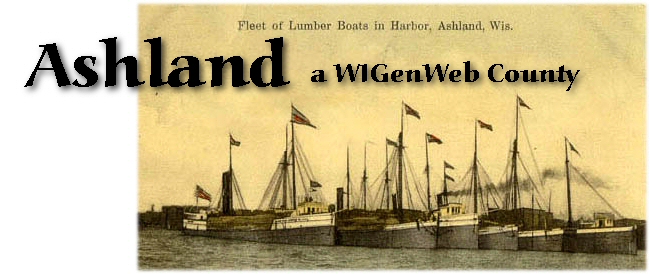
 |
|
White Boy Grew up Among Chippewas Son of Pioneer Missionary
"Bastian," the Indians and Voyageurs called him. He is William H. Wheeler, today a retired businessman of Beloit and veteran of the Civil War. He was born 84 years ago where today in the Indian village of Odanah in Ashland County. His father was Leonard Hemenway Wheeler, for 25 years a missionary to the Indians, and an inventor as well. He has been called the "best friend the Chippewa have ever had." He saw that the Indian had to be civilized or exterminated, and established a civil government among them, developed improved educational work and founded Odanah, besides giving religious instruction. The Chippewas called him kekenoahnagmahgayweninnie - the teacher. When the teacher no longer possessed the physical strength necessary to make long journeys through the woods, from one Indian village to another, he resigned his post, removed to Beloit and with his son engaged in the manufacture of a windmill of an entirely new and successful type. A year before, at Odanah, he had constructed the first windmill of this type for the purpose of giving the Indians cheap power to crack the wheat which he was always urging them to grow. He believed that dependence on a harvest of wild rice caused wondering habits. He was determined that the Indians should become an agriculturist, and, to further work that, he put his Yankee ingenuity to work and originated the windmill along lines now known as the world over as the Eclipse Windmill. The same windmill is today manufactured by a company, which, years after the death of the missionary, bought the business. William Wheeler attended the school that his father had established for the Indian children. He learned to read in a spelling book printed with parallel columns of English and Ojibway words. This is said to have been the first book writing wholly or in part in Wisconsin. The young Bastian went into the forest hunting with the Indian boys. Many a time he has taken part in an Ojibway dance that circled about a pole decorated with a Sioux scalp. He learned the songs of the Canadian voyageurs rolled out as they swept their bateaux down the rivers or alone the shore of the lake. He can sing those songs today. One of them begins, 'La fille du rois, sauvages.' He remembers Michael Bousquet and Louis Generi and dozens of other light-hearted voyageurs.
William Wheeler has spent little time on Indian reservations since the Civil War. He has been engaged in important enterprises that have carried him to many different parts of the country. He has put in water tanks for railroads and water systems for numerous cities. But he has never lost his feeling of kinship with the Chippewas. Sometimes, yet, in a railroad station he surprises a family of waiting Indians by speaking to them in their own language. He reads what is ever written about Indian claims. All of his life he has listened to accounts of unscrupulous individuals cheating the Indians.
If this was to be prevented, Mr. Wheeler must be in Washington as soon as possible. This was in February 1859, when the railroad ran only as far as Sparta, Wisconsin. Mr. Wheeler was in Odanah. In spite of the fact that it was bitterly cold, the missionary friend of the Chippewas fastened on his snowshoes and started. With a blizzard behind his back all the way, he made the entire 250 miles and boarded the train at Sparta with feet cut and bleeding from the thongs of the snowshoes. He arrived in Washington ill, but in time to checkmate the machinations of the Indian Ring and saved the reservation of his Ojibway brothers. But the illness induced by the extreme hardships of the trip left him a broken man and finally caused his death. This 'Indian' trend to the lives of the Wheelers dates back to the translation of a certain book. Mr. Wheeler takes it from the shelf in his Beloit home - a New Testament in the Ojibway language, published in 1845. The translation was the work of the Reverend Sherman Hall, a missionary at La Pointe, on Madeline Island, at the mouth of the Chequamegon Bay in Lake Superior. The translation of the New Testament was responsible for bringing the Wheelers to Wisconsin. Now we will let William Wheeler tell the story. He reasons directly like a businessman but his speech has taken something both from the Indian and the missionary. His story begins when his father was a serious minded young theological student at Andover who has already received a degree in letters from Middlebury College in Vermont. This was in the late 1830s when a wave of missionary spirit was sweeping the country. Young Leonard Wheeler had decided to become a missionary. India was to be his field - India with its child marriages, baby girls drowned in the Ganges… India, waiting to be Christianized. Instead, he became a missionary to the Indians. "While father was studying at Andover," says William Wheeler, "The Reverend William Thurston Boutwell came on a visit from Mackinac where he had been a missionary since early in the 1830s, working under the American Board, composed of Congregationalists and Presbyterians." "Mr. Boutwell was looking for some young man who would agree to go to the mission at La Pointe and relieve the Reverend Sherman Hall of some of his duties so that he might be able to complete a translation of the New Testament into the Ojibway language. 'If you will go to La Pointe,' Mr. Boutwell said to father, 'Mr. Hall will be able to devote his entire time to the translation. Think of the far-reaching effects upon the Chippewa when they are able to read the Scriptures in their own language.'" "Father considered the problem. Indians won out over India and he decided to go to the west and teach the red man."
"The Lake Superior region was frontier in 1841. In spite of the fact that fur traders had been on the ground for many years and a mission had been established on Chequamegon Bay by Allouez in 1665 (176 years earlier.) Father Marquette, you remember, joined Allouez, but the Sioux forced them and their faithful Hurons to move eastward, 'like leaves before an autumn blast' and old account says." "There was a gap of more than 160 years between this first mission and the next one to be established on Lake Superior. In 1830 it was opened by the American Board at La Pointe, the new base of the American Fur Company, and the next year the Reverend Sherman Hall arrived to preach, teach and begin his translation of the New Testament. Now father and mother were to take over the missionary work so that Mr. Hall might complete his literary labors." "My parents went by steamboat to Mackinac. There they met the wife of Reverend Boutwell - he was the one that you will remember persuaded my father to go to La Pointe." "Mrs. Boutwell was Hester Crooks, a daughter of Ramsay Crooks and her mother was a French and Indian girl from Mackinac, where Mr. Crooks had been John Jacob Astor's headman. It was quite the fashion to marry half-breeds in those days." "When Astor withdrew from the fur trade Ramsay Crooks became president of the American Fur Company. He operated all over the west, at St. Louis, at various northern bases and even on the Pacific slope." "Washington Irving, in 'Astoria' gives a very good account of some of the adventures of Ramsay Crooks. He was one of the Astor party that forced their way across the Rockies, through the Indian Country and to Oregon in spite of terrific hardships." "The life of Crooks is a story ready for some writer of scenarios. After he left the west Crooks lived in New York City. He was one of the pallbearers at old John Jacob Astor's funeral." "Hester Crooks had been educated in the mission school at Mackinac. Before her marriage to Mr. Boutwell she had taught in the school." "As a boy I knew the Boutwells and listened to many a story told by others of their sacrifices and heroism. Mrs. Boutwell had the brain of her brilliant Scottish father and her Indian mother's soft eyes." "It was her husband who name Lake Itasca. He had gone on an expedition with Henry R. Schoolcraft to discover the source of the Mississippi. When it was determined, Mr. Boutwell, being a Latin scholar, was asked by Schoolcraft to form a name for the lake. He formed Itasca from the Latin words veritas (truth) and caput (head) - true head." "Mr. & Mrs. Boutwell spent their later years with the Minnesota Indians near Stillwater, Minnesota. By a curious chain of circumstances I happened to visit Mr. Boutwell during his last sickness. That was in 1897." "I was a businessman of 50 then and Madeline Island was far back in my past. I learned that Edwin Hall, son of the translator of the New Testament, was a Minnesota legislator. Now Edwin, who was a little older than I, had deviled me a good deal as a boy and at one time when we were men I had sent word to him that some day I would perpetrate to sell of his life on him. You know the half-breeds and French Canadians were chucked full of fun and were always playing jokes on each other. Naturally we followed their example." "In St. Paul I called upon Edwin, whom I had not seen for many years, and set forth that I was studying the various Indian dialects and that I had been recommended to go to him as one who was well posted." "I think I can call myself posted," replied Edwin, not recognizing me." "I want to ask a few questions," I said, 'So that you may determine whether or not I grasp the Ojibway language." "That's all right," said Edwin" "'How are your sisters and other female relations?' I asked in Ojibway. Then changing to English asked if the sentence was correctly spoken." "Edwin said that it was." "Do I seem to have grasped the language?" "Remarkably well." "I use to know you long ago," was my next sentence in Ojibway. "Our fathers were both preachers." "Hold on, which one of the Wheelers are you? You sold me completely… Lets make it a supper and a show." "Edwin and I went to see James O'Neil in Hamlet. During the evening he told me that the Boutwells were living near Stillwater. I resolved to hunt them up." "Through a government blacksmith who had once worked at Odanah, I located the farm. I found the aged missionary on the bed from which he would never rise. He greeted me and then with a trembling finger pointed to a white stone out the window. 'There lays Harriet,' he said, while tears welled up in his eyes. I was glad that I had gone to see him. He died not long after." "But I have gotten a long way from my story of the trip of my parents to Madeline Island in 1841." |
|
|
Last Update Monday, 07-May-2018 17:23:36 CDT

 |
WIGenWeb State Coordinator:
Tina Vickery WIGenWeb Assistante State Coordinator: Marcia Ann Kuehl Copyright 2010 by the WIGenWeb Team. All rights reserved. Copyright of submitted items belongs to those responsible for their authorship or creation unless otherwise assigned. |
 |